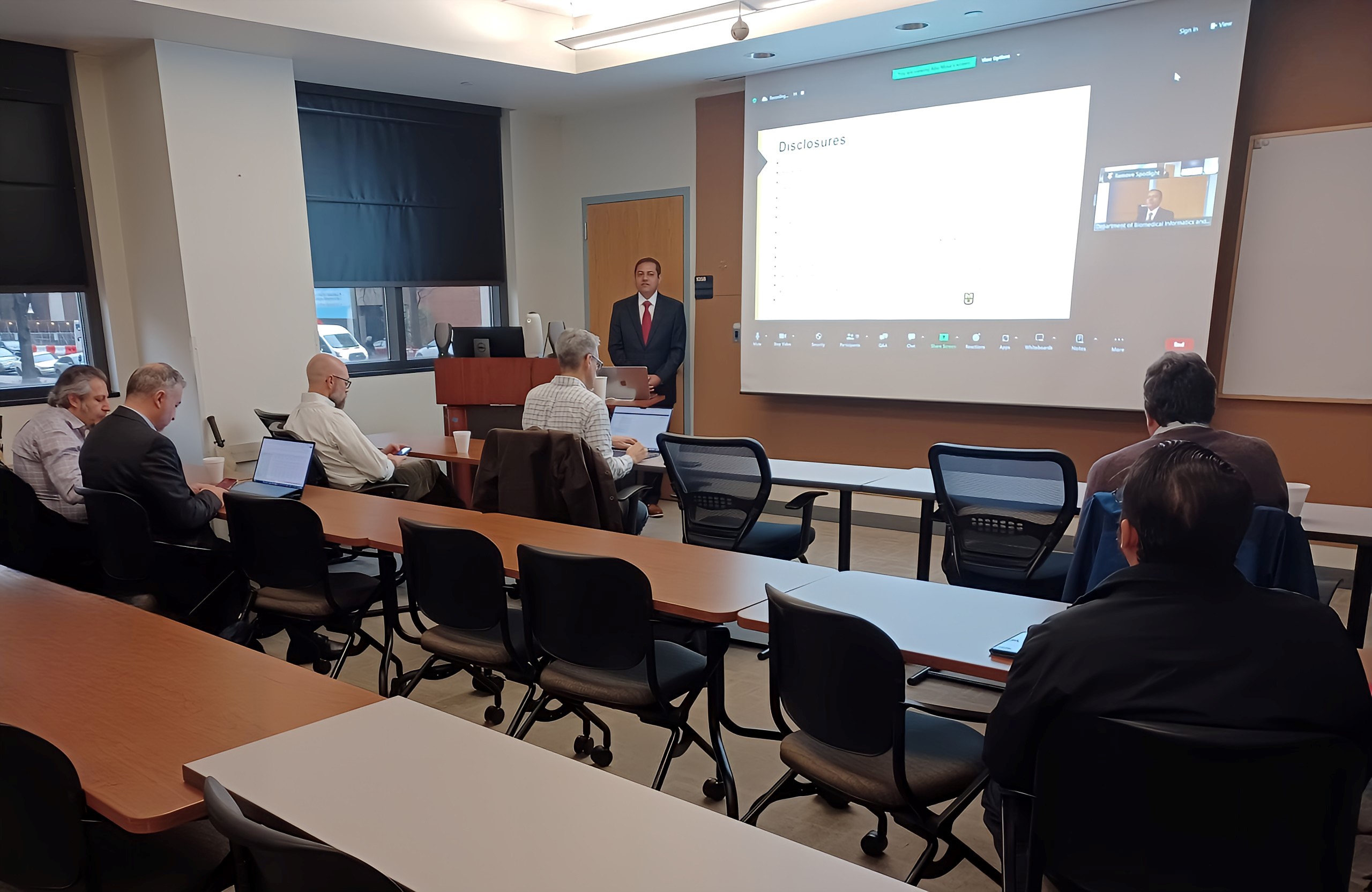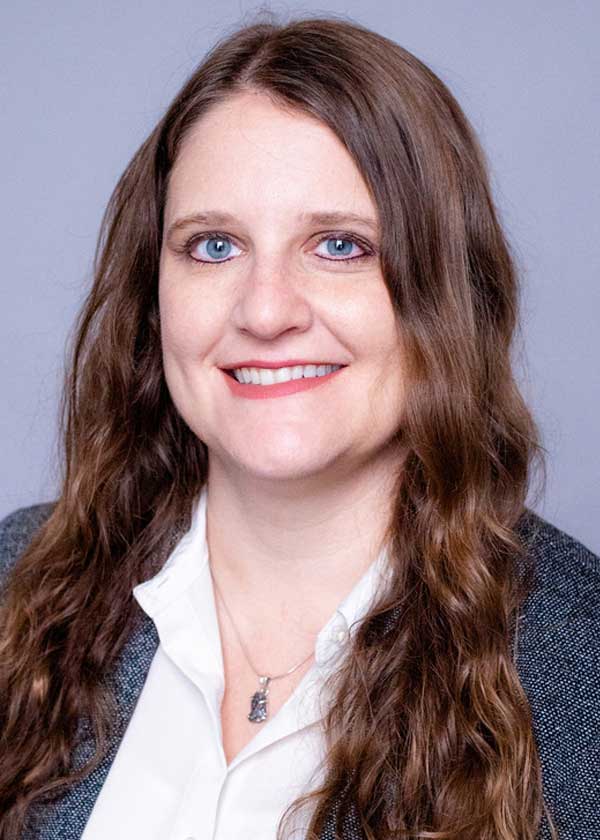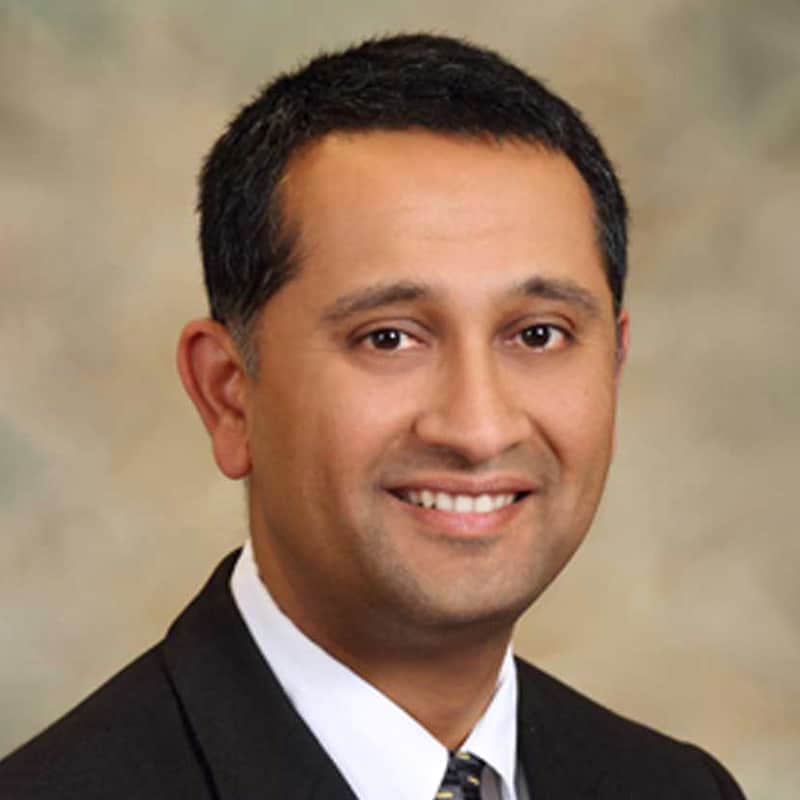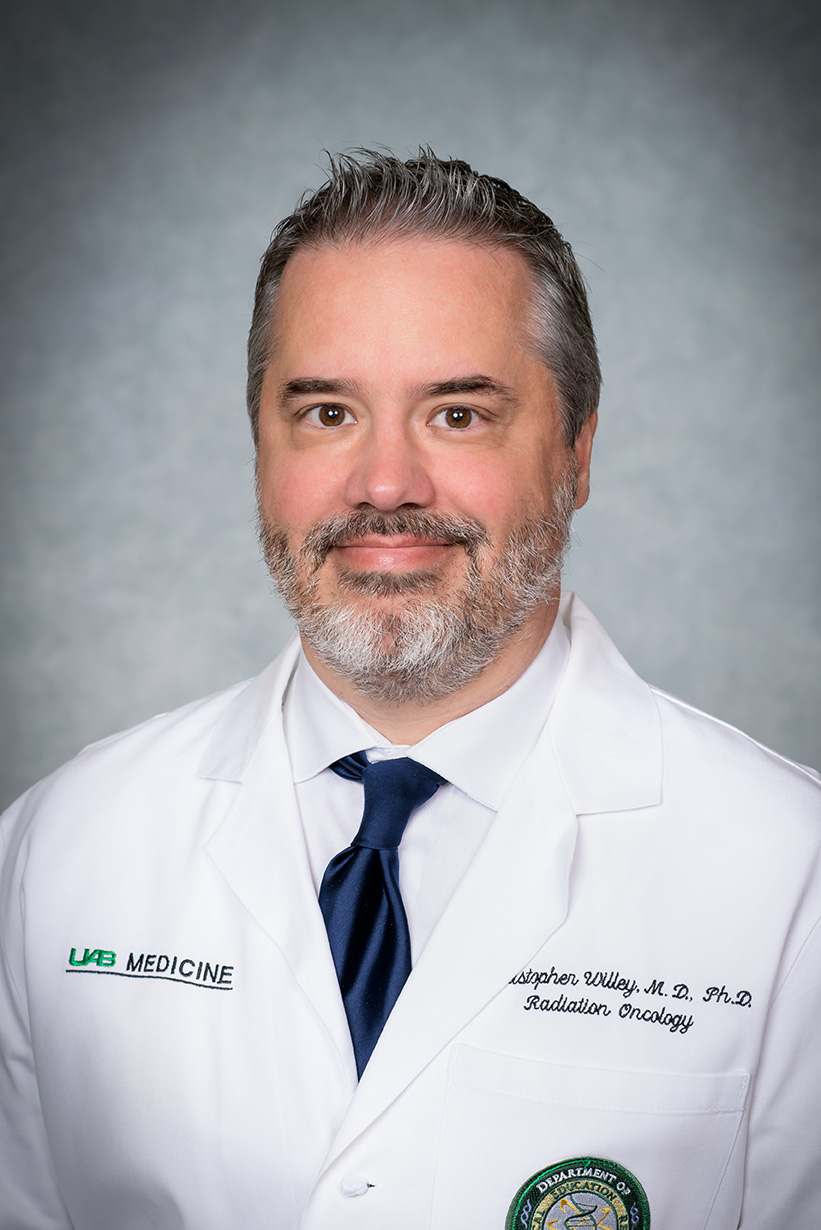
Fridays
10 - 11 a.m.
Hybrid
Virtual Location - Zoom
Physical Location - Shelby Biomedical Research Building (Conference Room 105)
Overview
This seminar series is developed and sponsored by the UAB Department of Biomedical Informatics and Data Science (DBIDS). It educates individuals on research innovations in biomedical informatics.
There are two tracks: Clinical Informatics (1st and 3rd Fridays) and Bioinformatics (2nd and 4th Fridays).
Clinical informatics seminars focus on the application of informatics for improving healthcare delivery and using health data for research. It includes diverse topics such as design, implementation, and clinical decision support.
Bioinformatics seminars present late-breaking computational techniques, tools and applications. It includes genomics and other -omics.
Some areas of informatics, such as precision medicine, natural language processing and image processing, span clinical informatics and bioinformatics and have greater crossover appeal. Presentations in these areas may be held in either 1st/3rd or 2nd/4th Fridays.
In addition to educating, we also strive to make these seminars social gathering places for the UAB clinical informatics and bioinformatics communities. We encourage you to attend to learn more about biomedical informatics and related disciplines and discover new opportunities for collaboration.
Organizer
Jake Chen - Chair
Amy Wang - Moderator for 2023-2024 series
Bioinformatics Steering Committee
Jake Chen
Zechen Chong
David Crossman
Curtis Hendrickson
Elliot Lefkowitz
Merry-Lynn McDonald
Hemant Tiwari
Clinical Informatics Steering Committee
Eta Berner
James Cimino
Tiago Colicchio
Tony Fargason
Jacqueline Moss
Bunyamin Ozaydin
Marisa Wilson
Amy Y. Wang
Click here to sign up for future PowerTalk Series updates
Upcoming PowerTalk Seminars
Register for the powertalks at the links below for the individual seminar. Once you have registered, you will receive a confirmation email with the information for joining the meeting.
Bioinformatics Seminar Archive
-
Alper Uzun, Ph.D. (April 12, 2024)

Alper Uzun, Ph.D. (April 12, 2024)
"Navigating the Genomic Landscape: Translational Bioinformatics Tools for Novel Drug Targets"
Alper Uzun, Ph.D., M.S.
Director of Cancer Bioinformatics at Legorreta Cancer Center
Associate Professor of Pathology and Laboratory Medicine
Associate Professor of Pediatrics
Warren Alpert Medical School of Brown UniversityIn this seminar, Dr. Uzun presented recent applications from his lab that offers new insights into disease mechanisms and assist in identifying potential drug targets.Dr. Uzun earned a Bachelor of Science degree in biology with a concentration in molecular biology from Istanbul University, followed by a Master's degree in medical biochemistry from Kocaeli University in Turkey.
-
Chang Su, Ph.D. (March 29, 2024)

Chang Su, Ph.D. (March 29, 2024)
Chang Su, Ph.D.
Assistant Professor of Biostatistics and Bioinformatics
Emory University Rollins School of Public HealthThe inference of gene co-expression from microarray and RNA-sequencing (RNA-seq) data has led to rich insights in biological processes and disease mechanisms. However, the bulk samples analyzed in most studies are a mixture of different cell types. As a result, the inferred co-expressions are confounded by varying cell type compositions across samples and only offer an aggregate view of gene regulations that may be distinct across different cell types. In this talk, we introduce two new statistical methods for inferring cell-type-specific co-expression networks based on two distinct types of RNA-seq data. First, to address the unique opportunity and challenge from the recently developed single-cell RNA-seq technology, we have proposed a novel method named CS-CORE that explicitly accounts for the high sequencing depth variations and measurement errors present in single cell data for estimating and testing cell-type-specific co-expression. When applied to analyze multiple scRNA-seq datasets, CS-CORE identified cell-type-specific co-expressions and differential co-expressions that were more reproducible and/or more enriched for relevant biological pathways than those inferred from existing methods. Moreover, to leverage the rich collection of bulk RNA-seq data from the past 15 years, we have also developed CSNet, a flexible framework to estimate cell-type-specific gene co-expression networks from bulk sample data and investigated theoretical properties of the proposed estimator. When applied to analyze bulk RNA-seq data from Alzheimer’s disease (AD), CSNet identified previously unknown cell-type-specific co-expressions among AD risk genes, suggesting cell-type-specific disease pathology in AD. The general framework in CS-CORE and CSNet can be adopted to integrate single cell and bulk RNA-seq data for more efficient use of the accumulating data in different diseases.
Dr. Chang Su is an assistant professor of Biostatistics and Bioinformatics at Emory University. Her main research interest is the development of statistical methods in single-cell genomics and genetics. Her current projects include the analysis of single-cell multi-omics data and genetic data for neurodegenerative, lung, and autoimmune diseases. Her methodological work has been published in leading scientific journals, such as Nature Communications, and leading statistics journals, such as the Journal of the American Statistical Association. Prior to Emory, Dr. Su received her Ph.D. in Biostatistics from Yale University.
-
Adam Wright, Ph.D., FACMI, FAMIA, FIASHI (March 22, 2024)

Adam Wright, Ph.D., FACMI, FAMIA, FIASHI (March 22, 2024)
Adam Wright, Ph.D., FACMI, FAMIA, FIAHSI
Professor of Department of Biomedical Informatics and Professor of Medicine
Director, Vanderbilt Clinical Informatics Center (VCLIC)
Vanderbilt University Medical CenterMuch of the early research on electronic health records (EHRs) and clinical decision support was done using hospitals’ own locally-developed EHR software. However, over the past decade, almost all hospitals have transitioned to commercial EHRs from a relatively small number of commercial vendors. In this talk, Dr. Wright discussed the challenges and opportunities of such conversions, and how we created the Vanderbilt Clinical Informatics Center to enable and sustain research and innovation in our commercial EHR.
Dr. Wright is Professor of Biomedical Informatics and Medicine at Vanderbilt University Medical Center and serves as the director of the Vanderbilt Clinical Informatics Center (VCLIC). Dr. Wright’s research interests focus on clinical decision support and machine learning. He has led NIH, AHRQ and ONC-funded projects on clinical problem lists, malfunctions in clinical decision support systems, approaches for sharing clinical decision support nationally and adverse event detection using machine learning. Dr. Wright has over 150 peer-reviewed journal publications, and nearly 100 additional publications, including abstracts, presentations in scientific meetings, books and book chapters. He is also a committed teacher, directing and lecturing in local, national and international courses on biomedical informatics, and teaching medical students.
-
Hongyu Zhao, Ph.D. (March 8, 2024)

Hongyu Zhao, Ph.D. (March 8, 2024)
"Statistical Methods for Cross-Population Genetic Risk Prediction of Complex Traits"
Hongyu Zhao, Ph.D.
Ira V. Hiscock Professor of Biostatistics and Professor of Genetics
Professor of Statistics and Data Science for the Affiliated Faculty of the Institute for Global Health
Yale UniversityThe polygenic risk score (PRS) has demonstrated great utility in biomedical research through identifying high-risk individuals for different diseases based on genotypes. However, the broader application of PRS to the general population is hindered by the limited transferability of PRS developed in Europeans to non-European populations. To improve PRS prediction accuracy in non-European populations, we have developed Bayesian methods that can effectively integrate genome wide association study (GWAS) summary statistics from different populations. Our methods automatically adjust for linkage disequilibrium differences between populations, and characterize the joint distribution of the effect sizes of a variant in different populations to be null, population specific, or shared with correlation. Through simulations and applications to real traits, we have shown that our methods improve prediction performance over existing methods in non-European populations.
Dr. Zhao is the Ira V. Hiscock Professor of Biostatistics at Yale University. He received his B.S. in Probability and Statistics from Peking University in 1990 and Ph.D. in Statistics from UC Berkeley in 1995. His research interests are the developments and applications of statistical methods in molecular biology, genetics, drug developments, and precision medicine. He is a Fellow of the American Statistical Association, the Institute of Mathematical Statistics, and the American Association for the Advancement of Science. He is the recipient of multiple honors, including the Mortimer Spiegelman Award for a top statistician in health statistics by the American Public Health Association, and Pao-Lu Hsu Prize by the International Chinese Statistical Association.
-
Chunhua Weng, Ph.D. (February 23, 2024)

Chunhua Weng, Ph.D. (February 23, 2024)
"Enabling the Next Generation of Evidence-Based Medicine with AI and Biomedical Informatics"
Chunhua Weng, Ph.D.
Professor of Biomedical Informatics
Columbia University Vagelos College of Physicians and SurgeonsIn this talk, Dr. Weng discussed the new opportunities presented jointly by big data, public knowledge, and emerging technologies for us to design the next generation of evidence-based medicine. Dr. Weng explored how large-scale electronic health records data and the latest advances in AI and biomedical informatics can be leveraged to support the life cycle of clinical evidence.
Dr. Chunhua Weng is a Professor of Biomedical Informatics at Columbia University and an elected fellow of American College of Medical Informatics (ACMI) and International Academy of Health Sciences Informatics (IAHSI). She has been co-leading the Biomedical Informatics Resource for the Columbia CTSA (The Irving Institute for Clinical and Translational Science) since 2011. She is also an Associate Editor for Journal of Biomedical Informatics. Dr. Weng holds a Ph.D. in Biomedical and Health Informatics from University of Washington at Seattle. Dr. Weng’s long-term goal is to improve the rigor, efficiency, patient centeredness, and generalizability of clinical research by developing novel informatics and data science methods to address stakeholder needs throughout the life cycle of clinical evidence, from evidence generation to evidence retrieval, appraisal, synthesis and dissemination.
-
Thomas Kannampallil, Ph.D. (February 2, 2024)

Thomas Kannampallil, Ph.D. (February 2, 2024)
"Using Raw Audit Logs to Measure Physician Workload, Cognitive Burden, and Burnout"
Thomas Kannampallil, Ph.D.
Associate Professor of Anesthesiology
Washington University School of MedicineDr. Kannamplallil's presentation highlighted the use of raw audit logs—trails of clinicians’ click stream activities on an EHR—to measure physician workload, cognitive burden and burnout using a combination of statistical and machine learning approaches.
In a series of studies, data pipelines and open-source tools have been developed for translating raw clickstream data into meaningful EHR use metrics that were used for (a) assessing workload, (b) creating objective measures of errors, and (c) assessing the relationship between workload (and cognitive burden) on errors. The presentation described new directions for research using audit logs including novel mathematical and machine learning techniques to characterize tasks, measuring interactive communication (using Epic SecureChat), and comparing audit log-based workload measures and reimbursements.
Dr. Kannampallil's research interests lie at the intersection of computer science, cognitive science, and clinical informatics. Specifically, his research focuses on developing and evaluating intelligent computational tools for improving clinical decision making and patient safety. He is currently the Associate Editor for the Journal of Biomedical Informatics and serve on ONC and PCORI technical expert panels on health information technology. His research is currently funded by 3 R01s from the National Library of Medicine (NLM), National Institute of Aging (NIA), and the Agency for Healthcare Research and Quality (AHRQ). He was elected as a Fellow of the American Medical Informatics Association in 2021.
-
James Cimino, M.D. (January 19, 2024)

James Cimino, M.D. (January 19, 2024)
"Biomedical Informatics: Year in Review"
James Cimino, MD
Distinguished Professor and Chair, Department of Biomedical Informatics and Data Science
Co-Director, Center for Clinical and Translational Science
Distinguished Professor of Medicine, Division of General Internal Medicine
UAB Heersink School of MedicineDr. Cimino’s presentation highlighted the most significant and exciting scientific developments in informatics over the past year. In collaboration with the Working Groups of the American Medical Informatics Association (AMIA), Dr. Cimino also presented papers from the past year in informatics with the greatest impact and broadest interest.
-
Yan Guo, Ph.D. (October 27, 2023)

Yan Guo, Ph.D. (October 27, 2023)
"Genomic Frontiers: Navigating Cutting-Edge Data Analysis in the Era of Precision Medicine"
Yan Guo, Ph.D.
Professor, Department of Public Health and Sciences
Director of Biostatistics and Bioinformatics Shared Resource
Chief of Bioinformatics Research Innovation
University of Miami (Florida) - Miller School of MedicineIn contemporary biomedical research, high-throughput genomic data screening often spearheads investigative endeavors. Notably, the diversity of available data has expanded significantly, necessitating inventive analytical methodologies. These approaches serve to augment our comprehension of biological phenomena, enhance predictive accuracy, and harbor substantial potential for propelling advancements in fundamental scientific principles and clinical applications within the realm of biomedical research. Using this opportunity, we shall elucidate several examples from our current research, with a paramount emphasis on soliciting feedback from a diverse audience.
-
Peng Qiu, Ph.D. (October 13, 2023)

Peng Qiu, Ph.D. (October 13, 2023)
"Quantifying the Clusterness and Trajectoriness of Single-Cell RNA-seq Data"
Peng Qiu, Ph.D.
Associate Professor, Department of Biomedical Engineering
Georgia Institute of Technology and Emory UniversityIn the literature of scRNA-seq, there are many algorithms for clustering analysis or trajectory inference, which are the two major types of analysis approaches. In practice, given an scRNA-seq dataset, researchers often choose one of the two types for analysis, depending on their expectations and intuitions on how the data should look like. If they believe the data consists of distinct clusters, they will analyze the data using clustering algorithms.
If they believe the data represents continuous progression, they will choose to apply trajectory inference algorithm. There also are studies where the researchers apply both types of methods on the same data, and interpret both results. However, because clustering and trajectory inference algorithms have been developed based on very different assumptions, they may generate vastly different visualizations that lead to very different interpretations of the same data.
Therefore, there is a great need to develop objective approaches to evaluate the geometry of scRNA-seq data. To address this need, we propose multiple scores to quantify the “clusterness” and “trajectoriness” of single-cell RNA-seq data, in other words, whether the data looks like a collection of distinct clusters or a continuum of progression trajectory. The scores we introduce are based on pairwise distance distribution, persistent homology, vector magnitude, Ripley's K, and degrees of separation.
Using simulated datasets, we demonstrate that the proposed scores are able to effectively differentiate between cluster-like data and trajectory-like data. Using real single-cell RNA-seq datasets, we demonstrate the scores can serve as indicators of whether clustering analysis or trajectory inference is a more appropriate choice for biological interpretation of the data.
-
Keren Li, Ph.D. (September 29, 2023)

Keren Li, Ph.D. (September 29, 2023)
"Unveiling Collective Intelligence: Navigating Representative Learning for Federated Insights"
Keren Li, Ph.D.
Assistant Professor of Mathematics
College of Arts and Sciences
University of Alabama at BirminghamIn the ever-evolving landscape of modern data exploration, the pursuit of collective intelligence has ushered in innovative paradigms that transcend conventional data analysis methods. Distributed learning, a fusion of big data and machine learning, orchestrates learning across nodes distinguished by their unique characteristics, including massive distribution, non-iid data, data imbalance, and constraints imposed by privacy and limited bandwidth. These multifaceted challenges disrupt the conventional norms of machine learning, necessitating innovative solutions that can harmonize disparate data perspectives while addressing critical concerns of privacy and resource constraints.
Representative Learning plays a pivotal role by crafting pseudo data points, known as representatives, which encapsulate the essential features of local data nodes. The representative sets are channeled to train regular models at the central unit, enabling a symphonic convergence of insights.
Representative Learning, with its ingenious architecture, serves as conduits that transcend the barriers posed by data privacy and scarce communication resources, sidestepping concerns that often hinder analysis. Moreover, distributed learning thrives in the heterogeneity between node distributions, particularly in settings characterized by vast node numbers. Smaller nodes inherently yield more reasonable representatives, while the inherent dissimilarity between nodes safeguards low variance of estimation from the representative learning approach.
-
Ramana V. Davuluri, Ph.D. (September 8, 2023)

Ramana V. Davuluri, Ph.D. (September 8, 2023)
"Application of Deep-Learning Algorithms in Bioinformatics Methods"
Ramana V. Davuluri, Ph.D.
Professor, Department of Biomedical Informatics
Graduate Program Director, Biomedical Informatics
Director, Bioinformatics Shared Resource, Stony Brook Cancer Center
Affiliate Facility, Institute for AI-Driven Discovery and Innovation
Stony Brook Medicine, State University of New York at Stony BrookBiomedical informaticians play critical roles in various biomedical research studies that deal with large volumes of data, such as EHR, imaging and -omics data. The rise of ‘Data Science’ offers exceptional opportunity to the informatics practitioners because of the universal relevance of statistical and informatics methods in the analyses and interpretation of data.
However, there are some challenges to become an impactful “Data Scientist”. The core of my talk will be a summary of some recent deep-learning applications in unraveling the non-regulatory genomic language (DNABERT) and multiomics data analyses (DeepMOIS-MC), through which there will be a demonstration that Deep Learning together with Computational Systems make an essential contribution to the fields of ‘precision medicine’ and ‘genomics’ research.
-
Chen Huang, Ph.D. (March 31, 2023)

Chen Huang, Ph.D. (March 31, 2023)
"Proteogenomics Presents New Avenues for Tumor Systems Biology"
Chen Huang, Ph.D.
Assistant Professor of Genetics
Scientist, Precision Medicine Institute and O'Neal Comprehensive Cancer
UAB Heersink School of Medicine -
Avi Ma'ayan, Ph.D. (March 24, 2023)

Avi Ma'ayan, Ph.D. (March 24, 2023)
Avi Ma'ayan, Ph.D.
Mount Sinai Endowed Professor in Bioinformatics
Professor, Department of Pharmacological Sciences
Director, Mount Sinai Center for Bioinformatics
Icahn School of Medicine at Mount Sinai -
Zechen Chong, Ph.D. (March 10, 2023)

Zechen Chong, Ph.D. (March 10, 2023)
"The Genomic Landscape of Cancer in Individuals with Different BMI
Zechen Chong, Ph.D.
Associate Professor of Genetics and Scientist, Informatics Institute
UAB Heersink School of MedicineOverweight and obesity, as measured by body mass index (BMI), can have significant negative impacts on human health due to associated co-morbidities. Epidemiological data have demonstrated strong associations between overweight/obesity and 13 different types of cancer. However, the molecular features underlying the relationship between body weight and cancer remain poorly understood.
To address this gap in knowledge, we conducted a comprehensive analysis of molecular differences between patients with overweight/obesity and normal BMI patients in 14 different cancer types from The Cancer Genome Atlas (TCGA). Using the propensity score weighting algorithm to balance other confounding factors, we identified obesity-specific mutational features in multiple cancer types, such as higher mutation burden in rectal cancer and biased mutational signatures in several cancer types.
We also found differential expression genes (DEGs) enriched in inflammatory, immune, and hormone-related pathways, which were upregulated in overweight and obese groups. Interestingly, while high BMI seems to have a negative impact on most cancer types, it may be beneficial in endometrial cancer, as reflected by normal-weight biased mutational and gene expression patterns.
Moreover, we observed that certain types of infiltrating immune cells were recruited in some cancer types but not others, indicating a complicated micro-environment involving high BMI and tumor type. Overall, our study provides a systematic understanding of the molecular basis for body weight disparities in multiple cancer types. This knowledge may provide critical insights into the future development of precision cancer therapy for cancer patients with overweight/obesity.
-
W. Jim Zheng, Ph.D. (February 24, 2023)

W. Jim Zheng, Ph.D. (February 24, 2023)
"Distributed Representation of Biological Concepts"
W. Jim Zheng, Ph.D.
Professor, School of Biomedical Informatics
Founding Director, Data Science and Informatics Core for Cancer Research
Director, Bioinformatics and High Performance Computing Service Center
Associate Director, Center for Computational Biomedicine
The University of Texas Health Science Center at HoustonBiological concept representation through annotation and representation plays a crucial role in furthering biomedical research. Over the years, advancements in genome research have brought about a transformation in the way biological concepts are represented, evolving from manual annotation to distributed representation, deep learning-based representation, and finally to contextual embeddings extracted from large language models. This presentation takes a look at the historical progression of distributed representation of biological concepts, followed by a discussion on the most advanced methods currently in use and their practical applications in biomedical research.
-
Jake Chen, Ph.D. and Zhandos Sembay, M.S. (February 10, 2023)

Jake Chen, Ph.D. and Zhandos Sembay, M.S. (February 10, 2023)
"Acing the New NIH Data Sharing Requirement with U-BRITE"
Jake Chen, Ph.D.
Professor of Genetics and Computer Science
Associate Director and Chief Bioinformatics Officer, UAB Informatics Institute
UAB Heersink School of MedicineZhandos Sembay, M.S.
Informatics Software Developer, UAB Informatics Institute
UAB Heersink School of Medicine -
Ece Uzun, Ph.D. (January 27, 2023)

Ece Uzun, Ph.D. (January 27, 2023)
"Machine Learning and Network Biology Applications in Genomics"
Ece (Gamsiz) Uzun, Ph.D.
Director of Clinical Bioinformatics, Lifespan Academic Medical Center
Assistant Professor of Pathology and Laboratory Medicine
The Warren Alpert Medical School of Brown University -
Emily Miraldi, Ph.D. (January 13, 2023)

Emily Miraldi, Ph.D. (January 13, 2023)
“Reverse-Engineering Regulatory Mechanisms from scRNA-seq and scATAC-seq”
Emily Miraldi, Ph.D.
Assistant Professor, University of Cincinnati, Department of Pediatrics
Divisions of Immunobiology and Biomedical Informatics
Cincinnati Children’s Hospital -
Jing Su, Ph.D. (December 9, 2022)

Jing Su, Ph.D. (December 9, 2022)
Jing Su, Ph.D.
Assistant Professor and Director of Data Management Services
Department of Biostatistics and Health Data Science
Associate Director of Real-world Data, Biostatistics & Data Management Core
Simon Comprehensive Cancer Center
Indiana University School of MedicineChronic kidney disease (CKD) is common, affecting 14.8% of US adults, and disproportionately more in diverse and underserved communities. Among the modifiable risk factors, drug induced acute kidney injury (AKI) contributes to CKD development and progression. Electronic health records (EHRs) from electronic medical records (EMR) and health insurance claims data can help predict disparate CKD progression trajectories and uncover novel, trajectory-specific risk factors.
The Indiana University School of Medicine (IUSM) EHR collection includes rich clinical information for 85 million individuals from regional and national populations over two decades. The IUSM EHR collection is composed of Optum EHR derived from the Optum Clinformatics™ claim data and the Indiana EHR incorporated from the EMR data of Indiana Network for Patient Care (INPC) Research Database, Indiana University Health (IUH), and Eskenazi Health (EH).
Our team is developing the DisEase PrOgression Trajectory (DEPOT), an evidence-driven, graph-based clinical informatics approach to model CKD progression trajectories and individualize clinical decision support. DEPOT is generating novel knowledge about the landscape of CKD health trajectories, bridging gaps between rich longitudinal EHR data and decision support for precision medicine in CKD. Our work will shift paradigms of big data and complex disease research, enabling EHR data to become part of daily CKD management.
-
Yu "Brandon" Xia (November 11, 2022)

Yu "Brandon" Xia (November 11, 2022)
"Multiscale Modeling of Biomolecular Networks"
Yu "Brandon" Xia
Professor, Department of Bioengineering
Canada Research Chair in Computational and Systems Biology, McGill UniversitySystems biology aims to build a working model of cells by first mapping the network of interactions among intracellular proteins and other biomolecules. While highly successful, this network-based view of cells often treats biomolecules and their interactions as nodes and edges, with little atomic detail. Such detail are important because atomic-level changes in the molecular circuitry can lead to large differences in cell behavior, as often happens in evolution and disease.
Here, recent work is presented on constructing genome-scale structural models of nodes and edges within protein-protein interaction networks, in order to probe design principles of proteins and protein networks at multiple scales. The intention is to show that this multiscale structural systems biology approach provides useful insights into evolution and species interaction, cellular complexity, and human disease.
-
Elliot J. Lefokowitz, Ph.D. (October 28, 2022)

Elliot J. Lefokowitz, Ph.D. (October 28, 2022)
"Virus Surveillance: Tools to Classify the Unknown"
Elliot J. Lefkowitz, Ph.D.
Professor, Department of Microbiology
Co-Director, Undergraduate Bioinformatics Program
Director of Bioinformatics, Center for Clinical and Translational Science
Director, Bioinformatics Core, Microbiome Facility
UAB Heersink School of MedicineOrganisms and the viruses that infect them can only be understood in the context of their relationships. This begins with the delineation of common and distinguishing properties and is formalized by the science of taxonomy which creates an ordered, hierarchical system of classification and nomenclature.
For over 50 years, the International Committee on Taxonomy of Viruses (ICTV) has formally provided scientists, students, government agencies, and the interested public with a burgeoning taxonomy for viruses along with the resources for exploiting that taxonomy. The ICTV communicates the results of its work on a web site (https://ictv.global) that provides the current virus taxonomy, historical taxonomic records, and descriptive information on each virus family (the ICTV Report).
As Data Secretary for the ICTV, I have received NIH funding to significantly expand the information and tools provided by the ICTV. Our goal is to build a comprehensive biomedical knowledgebase supporting virus classification that will serve as a novel, scalable, sustainable infrastructure for supporting transformative research by virologists worldwide.
Our aims focus on utilizing this infrastructure to provide increased availability and breadth of taxonomic and virological information; better tools to manage taxonomic classification and handling of data supporting high-throughput virus classification and curation; enhanced accessibility to individuals, groups, and information repositories; and an outreach and training program to ensure that the products of our efforts are used to benefit stakeholders and to promote better understanding of viruses and their classification.
Our intention is to make virus classification and taxonomy more approachable and more useful to the virology and wider scientific community and for the ICTV web site to serve as a useful and used conduit for these expanded resources.
-
Chindo Hicks, Ph.D. (October 14, 2022)

Chindo Hicks, Ph.D. (October 14, 2022)
"Harnessing Bulk and Single Cell Omics Data for the Discovery of Biomarkers in Cancer"
Chindo Hicks, Ph.D.
Director, Bioinformatics and Genomics Program
Professor, Department of Genetics
LSU Health Sciences Center New Orleans School of MedicineOur understanding of cancer and how best to treat it is hampered by the complexity of the human system in which the disease is manifested. This has been further complicated by the COVID-19 pandemic which has made clinical management of cancer patients a major challenge.
Unlike simple Mendelian disorders, in which highly expressive, highly penetrant mutations make it possible to identify the causal genes, cancer originates from a more complex interplay between constellations of genomic changes in the cancer genome and genomic alterations in the cellulome.
These complex arrays of interacting biological factors affect molecular networks and signaling pathways which in turn increase or decrease the risk of disease or affect disease severity. With recent advances in next generation sequencing technologies and the availability of omics data on both bulk RNA-Seq and single cell RNA-Seq (scRNA-Seq), we are now well-positioned to harness these data to discover potential clinically actionable biomarkers.
Integrating large-scale, high-dimensional bulk RNA-seq with scRNA-Seq data holds promise for not only defining the molecular signatures, network states and signaling pathways driving the disease but also for the discovery of clinically actionable biomarkers and potential therapeutic targets.
This presentation focuses on harnessing bulk (RNA-seq) and single cell (scRNA-seq) Data for the Discovery of Biomarkers in lung adenocarcinoma, a lethal disease worldwide, and a cancer with the worst clinical outcomes in the COVID-19 pandemic era. The power of integrative genomics analysis for the discovery of potential clinically actionable biomarkers and for elucidation of the association between lung cancer and COVID-19 will be demonstrated.
-
John F. McDonald, Ph.D. (September 30, 2022)

John F. McDonald, Ph.D. (September 30, 2022)
"An Integrated Approach to Ovarian Cancer Diagnostics and Therapeutics"
John F. McDonald, Ph.D.
Director, Integrated Cancer Research Center
Professor, School of Biological Sciences, Georgia Institute of Technology
Chief Scientific Officer, Ovarian Cancer Institute -
Rahul Singh, Ph.D. and Jill S. Barnholtz-Sloan, Ph.D. (September 9, 2022)

Rahul Singh, Ph.D. and Jill S. Barnholtz-Sloan, Ph.D. (September 9, 2022)
"Using AI-Algorithms to Advance Drug Discovery for Neglected Parasitic Diseases"
Rahul Singh, Ph.D
Professor, Department of Computer Science
San Francisco State UniversityFinding cures for neglected tropical diseases (NTDs) is one of the most complex and crucial endeavors in modern science. This class of diseases encompasses a number of infection categories, including helminth infestations as well as protozoan, bacterial, and viral infections. Cumulatively, these diseases impact a significant fraction of the world’s population and research indicates that NTDs are prime factors depriving affected people of their health, livelihood, and economic potential. In this session, Dr. Singh describes how AI-algorithms and image data science can be applied to model and analyze complex high-dimensional data obtained from chemical-biology and drug screening experiments. The talk also focuses on the etiological agent of schistosomiasis, one of the most significant tropical diseases, and show how the AI-based computational approach has led us, together with fellow researchers, to a solution for a historically longstanding problem that had bottlenecked quantitative and high-throughput chemical biology/drug discovery in this disease area.
“#DataMatters - Leveraging Big Data for Cancer Discovery and Impact”
Jill S. Barnholtz-Sloan, Ph.D
Associate Director for Informatics and Data Science (IDS)
Center for Biomedical Informatics and Information Technology (CBIIT)
Senior Investigator, Trans-Divisional Research Program (TDRP)
Division of Cancer Epidemiology and Genetics (DCEG)
National Cancer Institute (NCI)Data is everywhere! In the cancer research space, data has had a great impact on how we diagnosis cancer, how we make decisions about treatment choices for cancer and how we think about cancer prognosis. This lecture discusses how big data has impacted cancer to date, and how it will impact cancer in the future, providing a specific example in brain tumors.
-
Tao Jiang, Ph.D., (April 8, 2022)

Tao Jiang, Ph.D., (April 8, 2022)
“Predicting Isoform Functions via Deep Learning and Refinement of Interaction Networks”
Tao Jiang, Ph.D.
Distinguished Professor
Department of Computer Science and Engineering
University of California, RiversideAlternative splicing generates multiple isoforms from a single gene, greatly increasing the functional diversity of a genome. Although gene functions have been well studied, little is known about the specific functions of isoforms, making accurate prediction of isoform functions highly desirable. In this talk, we present two recent approaches to predict isoform functions.
The first method, DIFFUSE, integrates isoform sequences and expression profiles to systematically predict isoform functions, by combining the power of deep learning and probabilistic graphical models. The second method, FINER, jointly predicts isoform functions and isoform-isoform interactions through the introduction of a unified learning objective, enabling the two tasks to benefit from each other.
Our extensive computational experiments demonstrate that these methods could effectively predict the functions of isoforms and genes with an accuracy significantly higher than the state-of-the-art methods.
We further validate the prediction results by analyzing the correlation between functional similarity, sequence similarity, expression similarity, and structural similarity, as well as the consistency between the predicted functions and well-studied functional sequence features, tissue specificity and subcellular localization of isoforms in the literature.
-
Qianqian Song, Ph.D. (March 25, 2022)

Qianqian Song, Ph.D. (March 25, 2022)
“Data-driven Informatics Research for Precision Oncology”
Qianqian Song, Ph.D.
Assistant Professor of Cancer Biology
Wake Forest School of MedicineTo provide real-world evidence on risks and outcomes of breakthrough COVID-19 infections in vaccinated patients with cancer, we used the National COVID Cohort Collaborative (N3C) to identify breakthrough infections between December 1, 2020, and May 31, 2021.
We included patients partially or fully vaccinated with mRNA COVID-19 vaccines with no prior SARS-CoV-2 infection record. Risks for breakthrough infection and severe outcomes were analyzed using logistic regression. Real-world evidence shows that patients with cancer, especially hematologic malignancies, are at higher risk for developing breakthrough infections and severe outcomes.
Patients with vaccination were at markedly decreased risk for breakthrough infections. Future work is anticipated to assess boosters and new SARS-CoV-2 variants.
-
Thanh Nguyen, Ph.D. (February 25, 2022)

Thanh Nguyen, Ph.D. (February 25, 2022)
“Machine Learning Finds New Insights in Cardiac Regeneration”
Thanh Nguyen, Ph.D.
Postdoctoral Fellow, Dept. of Biomedical Engineering and Informatics Institute
UAB Heersink School of Medicine -
Zongliang Yue, Ph.D. (February 11, 2022)

Zongliang Yue, Ph.D. (February 11, 2022)
“Functional Genomics Downstream Analysis and Common Informatics Tools”
Zongliang Yue, Ph.D.
Postdoctoral Fellow, Informatics Institute
UAB Heersink School of MedicineIntegrative geneset, network, and pathway analysis have emerged in the past decade to address challenges in functional genomics analysis, such as coverage of content, rendering of complex network-based models, and easy-to-use software with advanced features. In this talk, Dr. Yue reviews and discusses the three generations of geneset, network, and pathway analysis. Dr. Yue also provides use cases in cancer studies with bulk and single-cell sequencing data and highlight improved models for functional genomics analysis at the system level using the Pathways, Annotated-list, and Gene-set Electronic Repository (PAGER).
-
Brittany N. Lasseigne, Ph.D. (January 28, 2022)

Brittany N. Lasseigne, Ph.D. (January 28, 2022)
“Genome-Guided Rare Disease Diagnosis and Drug Targeting Strategies”
Brittany N. Lasseigne, Ph.D.
Assistant Professor, Department of Cell, Developmental and Integrative Biology
Associate Scientist, O'Neal Comprehensive Cancer Center
Scientist, Hugh Kaul Precision Medicine Institute
Scientist, Informatics Institute -
2021
2021
November 12, 2021
“Translating Big Data to Effective Cancer Therapy”
Aik Choon Tan, Ph.D.
Vice Chair, Department of Biostatistics and Bioinformatics
Moffitt Cancer Center
November 5, 2021
“Facilitating Collaborative Research: Data Harmonization and Pooling”
Eneida A. Mendonca, MD, Ph.D., FAAP, FACMI
Vice President for Research Development and Interim Director, Center for Biomedical Informatics
Regenstrief Institute, Inc.
Professor of Pediatrics and Biostatistics, Indiana University School of Medicine
October 22, 2021
“Data Science Sherpas: UAB Research and the Journey to the Computer”
Blake Joyce, Ph.D.
Data Science Manager
UAB Research Computing
October 8, 2021
“From Collecting Multi-Omic Data to Inferring Meaning”
Ewy A. Mathé, Ph.D.
Director of Informatics, Division of Preclinical Innovation
DPI Cores
National Center for Advancing Translational Sciences (NCATS)
National Institute of Health
September 24, 2021
“Harnessing Public Genomics Big Data to Gain Functional Insights on Complex Diseases”
Zhaohui "Steve" Qin, PhD, MS
Professor, Department of Biostatistics and Bioinformatics
Rollins School of Public Health
Emory University
September 10, 2021
“Identifying Viruses, their Integration sites, and Regulatory Factors in Host Genomes”"
Zhongming Zhao, Ph.D, MS.
Chair Professor and Director, Center for Precision Health
School of Biomedical Informatics
University of Texas Health Science Center at Houston
August 27, 2021
"Using the Wisdom of Crowds to Address Computational Grand Challenges in Biomedicine"
Gustavo Stolovitzky, Ph.D.
Program Director, Translational Systems Biology and Nanobiotechnology
Thomas J. Watson Research Center
DREAM Challenges Founding Chair Emeritus and Director
IBM Exploratory Life Sciences Council Chair
April 30, 2021
“Computational Pathology and Integrative Genomics for Cancer Research”
Kun Huang, Ph.D., FAIMBE
Professor and Vice-Chair for Data Science, Department of Biostatistics and Health Data Science
Precision Health Initiative Chair for Genomic Data Science
Director of Data Science and Informatics, Precision Health Initiative
Assistant Dean for Data Science
Associate Director of Data Science, Simon Comprehensive Cancer Center
Indiana University School of Medicine
Senior Investigator, Regenstrief Institute
April 9, 2021
“Beyond BERT: Learning Representations for Clinical NLP”
Timothy Miller, Ph.D.
Assistant Professor of Pediatrics and Computational Health Informatics Program (CHIP)
Harvard Medical School
March 26, 2021
“The Collaboration Structures of Critical Care Teams and Patient Outcomes: A Retrospective Network Analysis”
You Chen, Ph.D.
Assistant Professor, Department of Biomedical Informatics
Vanderbilt University Medical Center
OHPEN Laboratory
March 12, 2021
“Brain Imaging Genetics: Integrated Analysis and Machine Learning”
Li Shen, Ph.D., FAIMBE
Professor of Informatics
University of Pennsylvania Perelman School of Medicine
Shen Lab
February 26, 2021
“Adapting Natural Language Processing Models Across Clinical Domains”
Steven Bethard, Ph.D.
Associate Professor
School of Information
University of Arizona
February 12, 2021
"Multi-omic Analysis of Health and Disease Across Thousands of People"
Nathan Price, Ph.D.
Co-CEO, Onegevity Health
Professor, Institute for Systems Biology
Co-Director, Hood-Price Integrated Laboratory for Systems Biomedicine
January 22, 2021
"An Evidence-based Network Approach to Recommending Targeted Cancer Therapies"
Simina Boca, Ph.D.
Associate Professor
Department of Oncology and Department of Biostatistics, Bioinformatics and Biomathematics
Georgetown University Medical Center -
2020
2020
December 11, 2020
"Meta-Learning for Cancer Prediction and Survival Analysis"
Aidong Zhang, Ph.D.
Professor
Computer Science and Biomedical Engineering
University of Virginia
November 13, 2020
"Application of Single-Cell Data Analysis in Autoimmune Disease"
Min Gao, Ph.D.
Assistant Professor
Department of Medicine - Cardiovascular Disease
Associate Scientist
Informatics Institute
October 30, 2020
"Lessons from COVID-19: How Are Data Science and AI Changing Future Biomedical Research?"
Jake Chen, Ph.D.
Professor of Genetics and Computer Science
Associate Director of Informatics Institute
Chief Bioinformatics Officer
UAB Heersink School of Medicine
October 23, 2020
"Getting to the Edge of Biological Networks"
Shahid M. Mukhtar, Ph.D.
Associate Professor
Departments of Biology and Surgery
Scientist
Nutrition Obesity Research Center
UAB Heersink School of Medicine
October 9, 2020
"Genomic Tools for Third-Generation Sequencing Data Analysis"
Zechen Chong, Ph.D.
Assistant Professor of Genetics and Scientist
Informatics Institute
UAB Heersink School of Medicine
September 25, 2020
"Community-Relative Distance with Applications to Bioinformatics"
Ryan Melvin, Ph.D.
Assistant Professor of Surgery
Department of Anesthesiology
UAB Heersink School of Medicine
September 11, 2020
"Understanding the Impact of Social Determinants of Health on the COVID-19 Pandemic"
Ramaraju Rudraraju, Ph.D.
Assistant Professor of Surgery
Division of Cardiothoracic Surgery
UAB Heersink School of Medicine
May 8, 2020
“From ‘Big Data’ to ‘Little Data’ — From Information Disarray to Action”
William M. Tierney, M.D.
Professor, Department of Population Health
Chair, Department of Population Health
Dell Medical School
The University of Texas at Austin
April 24, 2020
“De-identification of UAB Clinical Text using Transfer Learning”
John D. Osborne, Ph.D.
Assistant Professor
UAB Heersink School of Medicine
Informatics Institute
April 10, 2020
“Bioinformatics for B-Cell Receptor Repertoire Sequencing Studies”
Alexander Rosenberg, Ph.D.
Associate Professor
Department of Microbiology
Scientist
Informatics Institute
UAB Heersink School of Medicine
March 27, 2020
"Mining and Prediction of Gene Functions for Systematic Study of the Genotype-Phenotype Map"
Nilesh Kumar
Ph.D. Student
UAB Department of Biology"The Systeomics of Arsenical Injury"
Bharat Mishra
Ph.D. Student
UAB Department of Biology
March 6, 2020
“The Coronavirus (COVID-19) Outbreak and Data-driven Healthcare: An Informatics Perspective”
Jake Chen, Ph.D.
Professor, Department of Genetics, Chief Bioinformatics Officer, Associate Director
Informatics Institute, UAB Heersink School of Medicine
February 14, 2020
"Deep Learning-driven Distance-based Ab Initio Protein Structure Prediction"
Jianlin Cheng, Ph.D.
William and Nancy Thompson Professor in Electrical Engineering and Computer Science, University of Missouri
January 24, 2020
"Omics Approaches for Insight to Skeletal Muscle Wasting and Weight Loss in COPD"
Merry-Lynn McDonald, Ph.D.
Director of Integrative ‘Omics and Assistant Professor, UAB Division of Pulmonary, Allergy and Critical Care Medicine, Department of Medicine
January 10, 2020
"Genomics, Machine Learning, and Osteoporosis Risk Assessment"
Qing Wu, ScD, MSPH, MS, MB
Associate Professor of Biostatistics, Department of Environmental & Occupational Health, School of Public Health and Nevada Institute of Personalized Medicine, University of Nevada, Las Vegas -
2019
2019
December 13, 2019
Topic: "Research Computing: Building Gateways To Science"
Speaker: Ralph Zottola, Ph.D.
Affiliation: Assistant Vice-President for Researching Computing, Chief Architect for UAB Research Computing Applications
November 22, 2019
Topic: "Polygenic Risk Scores: Are They GPS for Clinical Practice?"
Speaker: Hemant Tiwari, Ph.D.
Affiliation: William “Student” Sealy Gosset Endowed Professor, Department of Biostatistics, Section on Statistical Genetics, UAB School of Public Health
October 25, 2019
Topic: "AI-Informatics in Biomedicine: Find the Balance in Marriage"
Speaker: Thanh Nguyen, Ph.D.
Affiliation: Postdoctoral Fellow, UAB Heersink School of Medicine
October 11, 2019
Topic: "Control-Alter-Delete: Gene Regulatory Mechanisms in Brain Function and Disease"
Speaker: Jeremy Day Ph.D.
Affiliation: Associate Professor, Department of Neurobiology, UAB Heersink School of Medicine
September 13, 2019
Topic: "Bioinformatics for Single-cell Analysis: A Review of Computational Biology Trends and Application Opportunities"
Speaker: Jake Chen, Ph.D.
Affiliation: Professor, UAB Heersink School of Medicine, Department of Genetics and Computer Science, Associate Director of Informatics Institute, Chief Bioinformatics Officer
May 24, 2019
Topic: "Predicting genetic effect of missense variants using deep learning"
Speaker: Yufeng Shen, Ph.D.
Affiliation: Assistant Professor, Department of Systems Biology, Department of Biomedical Informatics, Columbia University
May 10, 2019
Topic: "A New Mathematical Framework for Convergence Computations"
Speaker: Murat Tanik, Ph.D.
Affiliation: Professor and Chair, UAB Department of Electrical and Computer Engineering, Wallace R. Bunn Chair of Telecommunications
April 26, 2019
Topic: "Whole-exome sequencing approach to select genes related to left ventricular hypertrophy in African Americans."
Speaker: Ryan Irvin, Ph.D.
Affiliation: Associate Professor in the Department of Epidemiology, School of Public Health, UAB
March 22, 2019
Topic: "Privacy-preserving Techniques for Sharing and Analyzing Human Genomic Data"
Speaker: Casey Greene, Ph.D.
Affiliation: Assistant Professor, Department of Pharmacology, University of Pennsylvania
February 8, 2019
Topic: "Strategies to Study Rare Diseases with 'Big Data'"
Speaker: Haixu Tang, Ph.D.
Affiliation: Director, Data Science Academic Programs, Professor of Informatics and Computing, Indiana University Bloomington
January 25, 2019
Topic: "Biological discoveries through bioinformatics analysis and research"
Speaker: Sheng Liu, Ph.D.
Affiliation: Junior Faculty, Indiana University Department of Medical & Molecular Genetics
January 11, 2019
Topic: "L-2-Hydroxyglutarate in Renal Cancer: Epigenetic Mechanisms and Liabilities"
Speaker: Sunil Sudarshan, M.D.
Affiliation: Associate Professor, UAB Department of Urology -
2018
2018
December 14, 2018
Topic: "The UAB Undiagnosed Diseases Program: Bioinformatic Applications in Rare Disorders"
Speaker: Bruce Korf, M.D., Ph.D.
Affiliation: Wayne H. and Sara Crews Finley Chair in Medical Genetics, Chief Genomics Officer, UAB Medicine, Co-Director, UAB-HudsonAlpha Center for Genomic Medicine, Associate Director for Rare Diseases, Hugh Kaul Personalized Medicine Institute
November 16, 2018
Topic: “From linear organization to the 3D genome architecture”
Speaker: Yichao Li, Ph.D.
Affiliation: Research Assistant, Ohio University School of Engineering and Computer Science
October 26, 2018
Topic: "Exploring the -Omics of Glioblastoma Using Patient-Derived Models of Cancer"
Speaker: Christopher Willey, M.D., Ph.D.
Affiliation: Director, UAB Kinome Core, Associate Professor, UAB Radiation Oncology
October 12, 2018
Topic: "Unraveling the meiotic recombination landscape in individual human genomes"
Speaker: Peng Xu, Ph.D.
Affiliation: Postdotoral Fellow, UAB Informatics Institute
September 28, 2018
Topic: "From chaos, DRAMA: Data-driven Research for Advanced Modeling and Analysis"
Speaker: Jeremy Blackburn, Ph.D.
Affiliation: Assistant Professor, UAB Department of Computer Science
September 14, 2018
Topic: “Computational prediction and modeling for protein-drug and protein-protein interactions”
Speaker: Daisuke Kihara, Ph.D.
Affiliation: Professor, Department of Biological Sciences and Department of Computer Sciences, Purdue University
August 24, 2018
Topic: "Deep Learning and Clustering Algorithms for Protein Scoring"
Speaker: Debswapna Bhattacharya, PhD
Affiliation: Assistant Professor, Auburn University
August 10, 2018
Topic: "Context fear memory formation is regulated by hippocampal lncRNA-mediated histone methylation changes"
Speaker: Anderson Butler
Affiliation: Ph.D. candidate in GBS Cell, Molecular & Developmental Biology Program and Graduate student in Lubin Lab
July 27, 2018
Topic: "HLA Population Genetics and Informatics to Optimize the Kidney Allocation System"
Speaker: Loren Gragert, Ph.D.
Affiliation: Assistant Professor, Tulane University
July 22, 2018
Topic: "Predicting regulatory variants with large-scale multi-omics data"
Speaker: Li Chen, Ph.D.
Affiliation: Assistant Professor, Auburn University
July 13, 2018
Topic: "Implementation of Next Generation Sequencing (NGS) Testing in Precision Oncology Advantages and Challenges"
Speaker: Shuko Harada, MD
Affiliation: Associate Professor, UAB Pathology
May 25, 2018
Topic: "Towards the ultimate diagnostics: NGS of immune repertoire"
Speaker: Jian Han, MD, PhD
Affiliation: Faculty Investigator, HudsonAlpha Institute for Biotechnology
May 11, 2018
Topic: "Comparative and evolutionary genomics of allelic imbalance in mammals"
Speaker: Xu Wang, Ph.D.
Affiliation: Assistant Professor, Auburn University
April 27, 2018
Topic: "Integrating high-throughput drug screening with targeted deep sequencing reveals novel treatment strategies for chemoresistant acute myeloid leukemia"
Speaker: Miranda Burnette, Ph.D.
Affiliation: T32 Fellow, UAB Department of Microbiology
March 23, 2018
Topic: "An Introduction to Applied Longitudinal Data Analysis"
Speaker: Lloyd J. Edwards, PhD
Affiliation: Professor and Chair, Deparment of Biostatistics School of Public Health
March 9, 2018
Topic: "Roles of Alternative Splicing in Complex Diseases"
Speaker: Yunlong Liu, Ph.D.
Affiliation: Professor, Indiana University School of Medicine
February 23, 2018
Topic: Integrating multidimensional data to catalyze translation of GWAs finds to biology and therapeutics
Speaker: Bingshan Li,PhD
Affiliation: Associate Professor, Vanderbilt University
February 9, 2018
Topic: Genomic disgnosis of developmental diabilities
Speaker: Greg Cooper, PhD
Affiliation: Faculty Investigator, HudsonAlpha Institute for Biotechnology
January 26, 2018
Topic: Impact of rare variants on eft ventrivular traits in African American using WGS
Speaker: Rafet Al-Tobasei, PhD
Affiliation: T32 Fellow, UAB Department of Biostatistics
January 12, 2018
Topic: Intergrative Anlaysis of Cancer Progression
Speaker: Sooryanarayana Varambally, PhD
Affiliation: Associate Professor, UAB Department of Pathology
Clinical Informatics Seminar Archive
-
Daniel Andrew Carnegie, M.D., MBA, MPH and Kimberly Shoenbill, M.D., Ph.D. (April 19, 2024)

Daniel Andrew Carnegie, M.D., MBA, MPH and Kimberly Shoenbill, M.D., Ph.D. (April 19, 2024)
"Leveraging Technology, People, and Processes to Improve Lung Cancer Screening"
Daniel Andrew Carnegie, M.D., MBA, MPH
Co-Chief Resident, Preventive Medicine Residency Program
University of North Carolina at Chapel HillKimberly Shoenbill, M.D., Ph.D.
Director, UNC Tobacco Treatment and Weight Management Programs
Director, UNC Clinical Informatics Fellowship Program
Assistant Professor of Family Medicine
University of North Carolina-Chapel Hill School of MedicineThis presentation described the use of informatics tools and workflows to address the urgent need for lung cancer screening in at-risk communities. This seminar describes how informatics methods are employed with a purposeful focus on data, technology, and alignment of resources with healthcare professionals and patient needs to improve lung cancer screening and patient outcomes.
-
Umberto Tachinardi, M.D. (April 5, 2024)

Umberto Tachinardi, M.D. (April 5, 2024)
"Skyline Vision: The Silver Lining in Scaling Healthcare AI Without Breaking the Bank"
Umberto Tachinardi, M.D.
Senior Vice President and Chief Digital Health Officer, UC Health
Interim Chair and Professor, Department of Biomedical Informatics
University of Cincinnati College of MedicineDr. Tachinardi's presentation guides attendees on a journey through the challenges and triumphs of integrating AI and ML into healthcare practice and research.
The delicate dance between groundbreaking potential and the harsh realities of financial constraints will be considered as critical factors of success and failure. With a focus on innovation and pragmatism, the seminar will address strategies in dealing with cost, legal and cultural barriers, finding creative and sustainable paths toward realizing the promise of AI in healthcare, and achieving the shared vision of making quality healthcare accessible, efficient, and affordable for all.
-
GQ Zhang, MS, Ph.D. (February 16, 2024)

GQ Zhang, MS, Ph.D. (February 16, 2024)
GQ Zhang, MS, Ph.D.
Professor and Distinguished Chair in Digital Innovation
Vice-President and Chief Data Scientist, Office of Data Science (ODS)
Co-Director, Texas Institute for Restorative Neurotechnologies (TIRN)
The University of Texas Health Science Center at HoustonDr. Zhang's discussion presented the rationale, strategic design and novel approaches employed for advancing NIH BRAIN Initiative's BICAN brain cell atlas program. NIMP consists of two portals for BICAN collaborative data generation: the Specimen Portal and the Sequence Library (SeqLib) Portal. The Specimen Portal focuses on tissue management from donors to brain slabs and annotated brain samples. The SeqLib Portal manages the workflow starting from tissue, all the way downstream to track data deposition to assay-dependent, data-modality-specific archives. Both portals work in tandem to generate multi-model genomic data that can be traced back to their anatomical origins using the Allen Brain Atlas.
The portals provide multiple types of data interfaces through dashboards, APIs, faceted query, and batch data ingestion and exporting. All of the underling functionalities are achieved through a robust agile development strategy using our NHash resource identifiers, metadata standardization, active combinatorial dashboarding, resource provenance linkage and rendering (e.g. via Sankey diagrams), and dedicated interfaces with NIH NeuroBiobank, sequencing centers, NeMO and BIL archives, and the larger BICAN data ecosystem.
-
Tapan Mehta, Ph.D. (January 26, 2024)

Tapan Mehta, Ph.D. (January 26, 2024)
"Towards Quintuple Aim in Primary Care: Role of Informatics and AI"
Professor and Vice Chair for Research
Department of Family and Community Medicine
UAB Heersink School of MedicineDr. Mehta's discussion focuses on studies that support the Quintuple Aim of improving population health, improving patient experience, improving provider experience, reducing cost, and health equity. Ongoing work is shared that brings pragmatic research study design framework such as Multiphase Optimization Strategy, informatics, and AI/ML applications to support the Quintuple Aim in primary care. Ongoing work related to diabetes management in primary care, developing access to effective health promotion programs for people with disabilities, and learning health system project related to reducing patient portal burden will be discussed.
-
Yanjun Gao, Ph.D. (December 1, 2023)

Yanjun Gao, Ph.D. (December 1, 2023)
"AI for Healthcare: How Can Large Language Models Help Physicians at the Bedside?"
Yanjun Gao, Ph.D.
Assistant Professor of Biostatistics
Medical College of WisconsinThe rise of large language models has revolutionized the field of natural language processing, reshaping the landscape of information processing and decision-making. LLMs have shown great promise in the realm of healthcare, for instance, synthesizing electronic health records (EHR) data, yet they also face unique hurdles due to the critical need for precise domain knowledge and the potential consequences of errors in medical applications.
This talk explored both the potential advantages and challenges of leveraging LLMs within clinical applications. The first part of the talk will examine the progress of clinical NLP in the past decades. Following that, the talk will present a novel knowledge-intensive EHR summarization task designed to optimize clinicians’ diagnostic workflow. It will then assess the performance of various LLMs, including knowledge-graph prompted models, in tackling this critical challenge.
-
Christian Reich, M.D., Ph.D. (November 17, 2023)

Christian Reich, M.D., Ph.D. (November 17, 2023)
"OHDSI's Odyssey: How Does an Open Source/Open Science Community Get to Grow and Make an Impact?"
Christian Reich, MD, Ph.D.
Professor of the Practice
OHDSI Center at the Roux Institute
Northeastern University
CEO, Odysseus Data ServicesDr. Reich, co-founder and Principal Investigator (PI) of Observational Health and Data Sciences and Informatics (OHDSI), discusses OHDSI and provides an overview of the organization as an Open Source and Open Science collaborative, along with its history, functioning and global network.
Dr. Reich touches upon the intricacies of its standardized data models like the Observational Medical Outcomes Partnership (OMOP) Common Data Model (CDM), and its array of analytical tools. Through various examples, Dr. Reich highlights how OHDSI is instrumental in advancing reproducibility and quality of real-world evidence in healthcare research.
-
Joanna Abraham, Ph.D. (November 3, 2023)

Joanna Abraham, Ph.D. (November 3, 2023)
"Augmenting Postoperative Handoffs"
Joanna Abraham, Ph.D.
Associate Professor of Anethesiology and Medicine, Section of Clinical and Translational Research
Roy and Diana Vagelos Division of Biology & Biomedical Sciences (DBBS) Institute for Informatics
Institute of Clinical and Translational Sciences
Washington University School of Medicine -
Donghua Tao, Ph.D., MA, MS, FAMIA (October 6, 2023)

Donghua Tao, Ph.D., MA, MS, FAMIA (October 6, 2023)
"Can ChatGPT Be Used to Answer Clinical Questions for Patients?"
Donghua Tao, Ph.D., MA, MS. FAMIA
Associate University Librarian for the Health Sciences and Associate Dean
University of Illinois at ChicagoChatGPT is increasingly receiving attention and has a variety of application scenarios in clinical practice, including decision support, medical documentation, telemedicine, and remote health care, etc. In addition, ChatGPT has been used for question-answering to provide information about diseases and medical queries. There are inconsistent reports in evaluating information quality of ChatGPT in answering clinical questions. Would the evaluation criteria for online health websites be applicable to evaluate ChatGPT information? What kind of clinical questions are answered by ChatGPT with good quality? Would the context of questions impact the quality of information answered by Chat GPT? The presentation summarizes the published literature on this topic, explores possible evaluation scheme of ChatGPT in the context of clinical questions-answering context, and exchange ideas of research design on the ChatGPT evaluation.
-
Ksenia Gorbenko, Ph.D., (April 14, 2023)

Ksenia Gorbenko, Ph.D., (April 14, 2023)
"A Hospital and Google Partnership to Implement a COVID-19 Inpatient Video Monitoring Program"
Ksenia Gorbenko, Ph.D.
Assistant Professor, Institute for Health Care Delivery Science
Department of Population Health Science and Policy
Icahn School of Medicine at Mount Sinai -
Melanie Besculides, DrPh, MPH (April 7, 2023)

Melanie Besculides, DrPh, MPH (April 7, 2023)
Melanie Besculides, DrPh, MPH
Assistant Professor, Institute for Health Care Delivery Science
Department of Population Health Science & Policy
Icahn School of Medicine at Mount SinaiMachine learning (ML)-based clinical decision support systems (CDSS) are popular in clinical practice settings but are often criticized for being limited in usability, interpretability and effectiveness.
Evaluating the implementation of ML-based CDSS is critical to ensure CDSS is acceptable and useful to clinicians and helps them deliver high quality health care. Malnutrition is a common and underdiagnosed condition among hospital patients that can have serious adverse impacts.
Early identification and treatment of malnutrition is important. We qualitatively evaluated the implementation of a ML tool, Malnutrition Universal Screening Tool (MUST)-Plus, that predicts hospital patients at high risk for malnutrition.
This talk discussed the importance of including qualitative methods to evaluate ML tools as part of an overall mixed methods evaluation approach, describe the qualitative methods we used, and share the themes that emerged from our evaluation, many of which are applicable beyond nutrition.
-
Wayne H. Liang, M.D., M.S. (March 3, 2023)

Wayne H. Liang, M.D., M.S. (March 3, 2023)
"Expanding Clinical Informatics Literacy and Workforce Capacity through Provider Builder Programs"
Wayne H. Liang, M.D., M.S
Director of Informatics Education and Outreach at Children's Healthcare of Atlanta
Pediatric Hematologist/Oncologist, Aflac Cancer & Blood Disorders Center
Assistant Professor of Pediatrics, Emory University School of Medicine -
Majid Afshar, M.D., MSCAR (February 17, 2023)

Majid Afshar, M.D., MSCAR (February 17, 2023)
Majid Afshar, M.D., MSCAR
Assistant Professor, Department of Medicine
Division of Allergy, Pulmonary and Critical Care Medicine and Department of Biostatistics and Medical Informatics
Co-Director, Critical Care Medicine Data Science Lab
University of Wisconsin School of Medicine and Public Health
Physician Informaticist and Pulmonary and Critical Care Physician, UW HealthDr. Afshar is a physician-scientist and maintains an NIH-funded clinical informatics laboratory dedicated to the prevention and early identification of diseases with a focus on translational natural language processing (NLP). The lab employs methods in NLP and machine learning with a multi-disciplinary team of scientists to support the full life cycle of data science. Dr. Afshar has built an infrastructure to perform NLP and machine learning tasks with electronic health record data for high throughput computable phenotypes and applied predictive modelling. He practices clinically as an intensivist at the University of Wisconsin-Madison where he takes care of patients with conditions that are also the focus of his research. He currently has an NIH R01 to implement and study NLP models in the health system and examine the effectiveness of AI-driven tools for clinical decision support. He is also the Director of the Learning Health System for the Institute of Clinical and Translational Research at UW. His talk will focus on a real-time NLP pipeline at UW Health for opioid misuse screening, building a Substance Misuse Data Commons, and helping to advance the field of diagnostic decision support systems using methods in NLP.
-
Richard Schreiber, M.D. (February 3, 2023)

Richard Schreiber, M.D. (February 3, 2023)
Richard Schreiber, M.D.
Associate Chief Medical Informatics Officer, Penn State Health Holy Spirit Medical Center
Associate, Department of Health Policy and Management, Johns Hopkins Bloomberg School of Public Health
Professor of Medicine, Geisinger Commonwealth School of MedicineThis clinical informatics seminar explores different types of governance structures; the desired participants in those structures; and the cultural competencies required. Governance for prioritization is complex, and requires well-defined processes for intake, evaluation, and CDS development.
-
Theresa L. Walunas, Ph.D., FAMIA (January 20, 2023)

Theresa L. Walunas, Ph.D., FAMIA (January 20, 2023)
Theresa L. Walunas, Ph.D., FAMIA
Assistant Professor of Medicine
Division of General Internal Medicine
Associate Director, Center for Health Information Partnerships
Northwestern University, Feinberg School of MedicineSystemic autoimmune diseases, like lupus, reflect an new frontier for computational phenotyping: they are complex diseases that develop over time, impact multiple organ systems and involves a large, multi-specialty care team. Physician diagnosis of lupus is the gold standard for identification of patients in EHR data, but the complexity of identification combined with many symptoms that mimic other conditions can result in late diagnosis for many patients, particularly those that have lower contact with the health care system or receive care across multiple health care systems. In this talk, developing strategies are shared to identify lupus in the absence of a clear diagnosis and the impact of fragmented healthcare on data availability for predicting disease and health outcomes for people with lupus.
-
William R. Hogan, MD, MS (December 2, 2022)

William R. Hogan, MD, MS (December 2, 2022)
"OneFlorida+ Informatics Infrastructure and Tools to Accelerate Clinical Research"
William R. Hogan, MD, MS
Professor, Health Outcomes and Biomedical Informatics
Director of Biomedical Informatics, Clinical and Translational Sciene Institute, University of Florida
Director of Informatics, OneFlorida Clinical Research ConsortiumThe OneFlorida+ Consortium is a clinical research network in the National Patient Centered Clinical Research Network or PCORnet. UAB joined OneFlorida+ officially in 2022. The OneFlorida+ Consortium maintains a robust data infrastructure to assist in cohort identification, hypothesis generation, pragmatic trials, comparative effectiveness research, and a variety of retrospective studies. The key component of the data infrastructure is the OneFlorida Data Trust. The discussion reviews OneFlorida+ and its purpose, PCORnet, the OneFlorida Data Trust, and a few studies that have successfully used OneFlorida+ and PCORnet infrastructure.
-
James Cimino, MD, FACMI, FACP, FNYAM, FAMIA, FIAHSI (November 18, 2022)

James Cimino, MD, FACMI, FACP, FNYAM, FAMIA, FIAHSI (November 18, 2022)
"Biomedical Informatics: Year in Review"
James J. Cimino, MD, FACMI, FACP, FNYAM, FAMIA, FIAHSI
Distinguished Professor and Chair, Department of Biomedical Informatics and Data ScienceWhat are the most significant and exciting scientific developments in biomedical informatics over the past year? The working groups of the American Medical Informatics Association (AMIA) provided papers in their respective domains (over 90 in total) representing the most influential or significant work published from September 2021 through September 2022. The presentation focuses on those papers with the greatest impact, broadest interest, and entertainment value in this 60-minute, multi-media event. This presentation focuses particularly on clinical informatics, although some developments in bioinformatics and clinical research informatics that have much to offer to domains (i.e. clinical medicine, public health) are included.
-
Tiago K. Colicchio, Ph.D., MBA (October 21, 2022)

Tiago K. Colicchio, Ph.D., MBA (October 21, 2022)
"Toward Designing Context-Aware Electronic Health Records with a Patient-Specific Knowledge Base"
Tiago Colicchio, Ph.D.
Assistant Professor of Medicine
Division of General Internal Medicine, Department of Biomedical Informatics and Data ScienceThe US health system has recently achieved nationwide electronic health record (EHR) adoption, with large-scale adoption of commercial systems. These systems were adopted without a much-needed redesign to address critical limitations, such as suboptimal interfaces, overzealous alerts, and bloated notes; as a result, unintended consequences have emerged at different levels of the US health system.
Recently proposed solutions to address EHRs’ limitations, such as improvements to EHR design and to clinical decision support (CDS) logic, may not be sufficient because the EHR would still miss relevant information that is buried in clinical notes or in the clinicians’ minds.
We believe that if patients’ care context data were routinely captured in computable form (modeled, structured, and coded), they could be used to inform better navigation, CDS, and data entry. In this presentation, we will describe the development of an ontology to formally represent patients’ care context data and its application to improve EHR navigation and CDS.
-
Jin Chen, Ph.D. (October 13, 2022)

Jin Chen, Ph.D. (October 13, 2022)
"Unbiased Representation of Clinical Data for Precise Patient Outcome Prediction"
Jin Chen, Ph.D.
Associate Professor, Division of Biomedical Informatics
Department of Internal Medicine
Department of Computer Science
University of KentuckyFairness is one of the newly emerging focuses for building trustworthy artificial intelligence (AI) models in healthcare. The behavior of a biased model often results in two problems: it performs significantly worse in certain populations than others, and it makes inequitable decisions towards patients with different backgrounds.
As a result, leaving the fairness problem unresolved might have a significant negative impact on deploying AI models in healthcare. Considering domain-specific and domain-invariant data representations as two special cases of data bias mitigation, we have developed a general, self-adaptive clinical data encoder model to learn unbiased and fair data representations from real-world Electronic Health Records (EHR).
The same fairness problem is also present in medical images, where image acquisition using non-standardized protocols often results in inconsistent image features, including texture, shape, or intensity. We have developed AI algorithms to harmonize medical images acquired using different acquisition protocols of the same scanner or images acquired using a similar protocol but with scanners from different vendors.
-
Swaminathan Kandaswamy, Ph.D. (September 16, 2022)

Swaminathan Kandaswamy, Ph.D. (September 16, 2022)
"Applications of Human Factor Engineering for Better Clinical Decision Support (CDS)"
Swaminathan Kandaswamy, Ph.D
Assistant Professor of Pediatrics
Emory University, School of MedicineElectronic health records (EHRs) have been touted as tools to improve healthcare safety, quality, and efficiency. With a great push from the government to increase adoption, EHRs are now ubiquitous. However, these EHRs have not lived up to expectations and have resulted in unintended consequences. Poor design has contributed to poor usability, clinician burnout, and ultimately, poor patient outcomes. In this talk, the concept of human factors engineering is introduced and describes some guidelines that can help with the design of clinical decision support, an important aspect of EHRs. Examples of projects are shared where human-centered design has led to better outcomes and greater clinician satisfaction, along with steps to improve CDS design.
-
William Hersh, MD, FAMCI, FAMIA, FIAHSI, FACP (September 2, 2022)

William Hersh, MD, FAMCI, FAMIA, FIAHSI, FACP (September 2, 2022)
William Hersh, MD, FAMCI, FAMIA, FIAHSI, FACP
Professor and Chair, Department of Medical Informatics and Clinical Epidemiology (DMICE)
Oregon Health and Science UniversityMachine learning and artificial intelligence (AI) have the potential to transform biomedicine and health, yet their promise remains largely unfulfilled. There have been many impressive achievements in applying AI to biomedical and health data in “basic science” settings, yet its value in every day clinical care or research is modest. This talk highlights some current accomplishments of AI, noted the need for clinical implementation and evaluation, and described some research by the speaker to assess AI in clinical settings.
-
Fabricio Kury, MD (April 1, 2022)

Fabricio Kury, MD (April 1, 2022)
“Current Practices and Frontiers in Rule-Based Electronic Phenotyping”
Fabrício Kury, MD
Clinical Data StrategistElectronic phenotyping is the process of identifying patient subjects for study, as well as their covariates, and is integral to the majority of secondary use cases of electronic health data sets. Rule-based phenotyping, the most common kind, starts from a definition in medical language, and manually produces a computer algorithm to model that definition based on how patient data is expected to exist, if it does. This presentation leverages examples from current phenotyping practice to walk the audience through its work process, and illustrate hindrances found along the way. Discussed topics include practical matters, such as deciphering mismatches in the results between phenotypes, uncovering logical gaps in medical definitions, comparing phenotypes definitions themselves, computing clinical scores from groups of data elements, as well as higher-level matters such as current software tools, and computational complexity in phenotyping.
-
Wayne H. Liang, MD, MS (March 11, 2022)

Wayne H. Liang, MD, MS (March 11, 2022)
Wayne H. Liang, MD, MS
Pediatric Hematologist/Oncologist and Physician Informaticist, Aflac Cancer & Blood Disorders Center
Children’s Healthcare of Atlanta Assistant Professor of Pediatrics, Emory University School of MedicineReal world data (RWD) sources, such as cancer surveillance and Electronic Health Record (EHR) data, can complement clinical trials in generating evidence on the comparative effectiveness of cancer treatment regimens. Such research requires a detailed understanding of the specific treatments that patients received, including regimen names, component drugs, associated research protocols, availability of published evidence, and other details. This presentation describes the development of pediatric regimen knowledge for HemOnc.org, an openly available, chemotherapy regimen knowledge resource, in partnership with the National Cancer Institute (NCI) National Childhood Cancer Registry (NCCR) program.
-
Raymonde Uy, MD, MBA (March 4, 2022)

Raymonde Uy, MD, MBA (March 4, 2022)
“Public and Population Health Informatics Challenges in addressing Health Disparities”
Raymonde Uy, MD, MBA
Physician InformaticistCommunity health centers deliver comprehensive primary and preventive health care to more than 30 million patients, including over 330,000 veterans, about 1 in every 12 Americans and 1 in 6 Medicaid patients through 1,400 federally qualified health centers (FQHCs).
These patient populations served by FQHCs around the country represent more than 14.5 million people living in poverty, 2.9 million people 65 and older, 19 million people who are of minority background and 1.5 million homeless people. FQHCs have been in the forefront in mobilizing SARS-CoV-2 testing, delivering COVID-19 care, pandemic information dissemination and providing vaccination access to the underserved, under-resourced and most vulnerable populations across the US.
Community health centers are located and serve areas where geographic, economic, and cultural barriers limit access to affordable health care. They serve as a critical safety net for these vulnerable populations who are at a higher risk for morbidity and mortality from COVID-19. These populations include ethnic and racial minority groups, migrant and agricultural workers, and low-income, financially unstable households.
Community health centers are critical in providing healthcare during the current COVID-19 pandemic, as they have previously played a front-line role in helping communities address public health emergencies like the Zika virus in Texas and Puerto Rico, the contaminated water crisis in Flint, Michigan, and the devastating opioid epidemic.
Furthermore, community health centers during the pandemic have served populations outside of their catchment areas through mobile testing sites and vaccination centers despite vaccine supplies impacting vaccination rates among minorities during the initial approval of the COVID-19 vaccines.
Building and harmonizing existing public and population health informatics infrastructures to align and connect with clinical and epidemiological data captured by community health center EHRs aggregated by regional Primary Care Associations (PCAs) and Health Center Controlled Networks (HCCNs) are integral in evaluating a disease or epidemic’s impact, burden, health disparities and outcomes on underserved and minority patient populations.
Through partnerships and coordination with federal public health agencies and HIT industry stakeholders, efforts are being made to create a community health center data registry, supported by SME-curated value sets, to utilize Social determinants/drivers of health (SDoH) and clinical data for vaccine surveillance, public health research and epidemiological monitoring.
This session discussed the interoperability and data extraction challenges from misaligned federal, state, and local reporting requirements, proprietary data standards and missing data, while sharing solutions and lessons learned from FQHCs and others in the field catering to populations suffering the most from health inequity and disparities.
-
Nicholas P. Tatonetti, Ph.D., FACMI (February 4, 2022)

Nicholas P. Tatonetti, Ph.D., FACMI (February 4, 2022)
“Data Is Transforming the Scientific Method”
Nicholas P. Tatonetti, PhD, FACMI
Associate Professor of Biomedical Informatics
Vagelos College of Physicians and Surgeons
Columbia UniversityData is transforming the scientific method across many domains. In drug safety, data from electronic health records and search logs are now being collected alongside traditional sources like case studies, spontaneous reporting systems, and model systems.
These data sources present new opportunities for studying the phenomenological and molecular effects of active small molecules. However, they also present new challenges in data integration, statistical analysis, and the nature of hypothesis generation. In this presentation, there is the discussion of these opportunities, upcoming challenges, and their role in the future of drug safety science.
-
Christopher D. Willey, M.D., Ph.D. (January 21, 2022)

Christopher D. Willey, M.D., Ph.D. (January 21, 2022)
“Multi-omic Translational Approaches to Investigate Therapeutic Resistance in Glioblastoma”
Christopher D. Willey, MD, PhD
Director UAB Kinome Core
Professor of Radiation Oncology
UAB Heersink School of MedicineGlioblastoma (GBM) is a devastating disease with median survival after diagnosis of only 15 months despite maximal safe resection, fractionated radiation therapy and alkylating chemotherapy with temozolomide. Despite large investments in molecularly profiling these tumors through efforts such as the TCGA, there has been limited clinical impact.
While GBM demonstrates both inherent and acquired resistance to therapy, most molecular approaches have focused only on treatment naïve specimens. Therefore, recent studies have focused on longitudinal assessment of GBM. This presentation summarizes some key recent studies as well as preclinical work at UAB related to therapeutic resistance in GBM.
-
Marcin P. Joachimiak, Ph.D. (January 14, 2022)

Marcin P. Joachimiak, Ph.D. (January 14, 2022)
“How to Teach a Computer to Learn about Microbes”
Marcin P. Joachimiak, PhD
Computational Biologist, Environmental Genomics and Systems Biology
Division, Biosystems Data Science Department
Lawrence Berkeley National LaboratoryMicroorganisms (microbes) are incredibly diverse, spanning all major divisions of life, and represent the greatest fraction of known species. A vast amount of knowledge about microbes is available in the literature, across experimental datasets, and in established data resources. While the genomic and biochemical pathway data about microbes is well-structured and annotated using standard ontologies, broader information about microbes and their ecological traits is not.
Our goal is to support tasks such as graph querying and link prediction in diverse use cases across microbiology, biomedicine, and the environment. To this end we are creating knowledge graphs (KGs) focused on microbes by semantically integrating diverse knowledge from a variety of structured and unstructured sources.
These efforts are supported by a knowledge graph construction platform (KG-Hub) for rapid development of KGs using available data, knowledge modeling principles, and software tools.
Finally, as part of a larger collaboration, we developed new graph processing and learning methods, allowing to scalably generate high quality embeddings for very large graphs.
We demonstrate the utility of our KG construction and learning approach by predicting microbial shape and other features using classifiers trained on microbial knowledge graph embeddings.
-
2021
2021
November 19, 2021
“Translating Big Data to Effective Cancer Therapy”Jim Cimino, MD, FACMI, FACP
Distinguished Professor of Medicine
Department of Medicine, Division of General Internal Medicine
Director, UAB Informatics Institute
Co-director, Center for Clinical & Translational Science
October 15, 2021
“Effective Use of EHR Data to Support Research: The Complementary Roles of Data Extraction and Data Transformation”James Willig, M.D., MSPH
Associate Professor
UAB School of Medicine,Department of Medicine, Division of Infectious Diseases
Associate Dean of Clinical Education
Director, Research and Informatics Services Center, Center for AIDS ResearchMatthew Wyatt, MSHI
Director of Clinical Research Informatics
Informatics Institute
UAB Heersink School of Medicine
October 1, 2021
“Translating Informatics Research into Practice"Daniel Fabbri, Ph.D., FAMIA
Assistant Professor of Biomedical Informatics and Computer Science
Vanderbilt University School of Medicine
September 17, 2021
“Incorporation of AHA Annual Survey Data into the UAB SHP Health Services Research Data Warehouse”Nichole Samuy, M.D.
Associate Professor of Pediatrics
Department of Pediatrics
Division of Pediatric Hospital Medicine
UAB Heersink School of Medicine
September 3, 2021
"An Integrated Optimization and Machine Learning Model to Predict Admission Status in Emergency Department Patients"Abdulaziz Ahmed, Ph.D.
Assistant Professor of Health Services Administration
UAB School of Health Professions
Associate Professor of Preventive Medicine
April 16, 2021
“A Multidimensional Precision Medicine Approach Identifies an Autism Subtype Characterized by Dyslipidemia”
Yuan Luo, Ph.D.
Associate Professor of Preventive Medicine
Chief AI Officer, Northwestern University Clinical and Translational Sciences Institute (NUCATS) and Institute of Augmented Intelligence in Medicine (IAIM)
Northwestern University Feinberg School of Medicine
March 5, 2021
“Building Tools to Support Family Centered Care: The InfoSage Experience"Charles Safran, M.D., MS, FACMI
Professor of Medicine
Harvard Medical School
February 5, 2021
“Update on UAB Autopsy Synoptic Reporting and Development of a COVID-19 Autopsy Virtual Biorepository”
Paul Benson, M.D.
Associate Professor
Department of Pathology
Division of Anatomic Pathology
UAB Heersink School of Medicine
January 29, 2021
"Leveraging Informatics to Create Learning Health Systems: Now, It’s Personal!"
Peter J. Embí, M.D., MS, FACP, FACMI, FAMIA
President & CEO
Regenstrief Institute
Leonard Betley Professor of Medicine and Associate Dean for Informatics & Health Services Research
Indiana University School of Medicine
Associate Director of Informatics
Indiana Clinical and Translational Sciences Institute (CTSI)
January 15, 2021
"Public Health Informatics in the Time of COVID-19"
Nicholas Soulakis, Ph.D.
Assistant Professor of Preventive Medicine (Health and Biomedical Informatics, Epidemiology) and Medical Social Sciences
Northwestern University Feinberg School of Medicine
Chief Public Health Informatics Advisor
Chicago Department of Public Health
Epidemiologist
Illinois Department of Public Health -
2020
2020
December 18, 2020
"Facilitating Collaborative Research: Data Harmonization and Pooling"Eneida A. Mendonca, M.D., Ph.D., FAAP, FACMI
Vice President for Research Development
Interim Director
Center for Biomedical Informatics
Regenstrief Institute
Professor of Pediatrics and Biostatistics
Indiana University School of Medicine
December 4, 2020
“A Critical Analysis of COVID-19 Research Literature: Text Mining Approach”Ferhat Zengul, Ph.D.
Assistant Professor
Health Services Administration
School of Health ProfessionsNurettin Oner, Ph.D., MHA
Research Associate
Health Services Administration
School of Health ProfessionsBunyamin Ozaydin, Ph.D.
Assistant Professor
Health Services Administration
School of Health Professions
November 20, 2020
“Biomedical Informatics Year in Review”
James Cimino, M.D., FACMI, FACP
Professor
Department of Medicine
Division of General Internal Medicine
Director
Informatics Institute
UAB Heersink School of Medicine
November 6, 2020
“Are We Talking About the Same Patient? Studying Nurse-Physician Language Differences”
Andrew Boyd, M.D.
Associate Professor
Biomedical and Health Information Sciences
University of Illinois at Chicago
October 2, 2020
"The Peril and Promise of Clinical Informatics"
David M. Liebovitz, M.D.
Co-Director, Institute for Augmented Intelligence in Medicine - Center for Medical Education in Data Science and Digital Health
Associate Vice Chair for Clinical Informatics, Department of Medicine
Associate Professor of Medicine (General Internal Medicine and Geriatrics)
Northwestern University Feinberg School of Medicine
April 17, 2020
“The Role of Telehealth in Reducing Health Disparities”
Mohanraj Thirumalai, Ph.D., MEng, MS
Assistant Professor, Health Services Administration, UAB School of Health Professions
February 21, 2020
"Diagnostic Decision Support Systems: An Educational Intervention to Increase Use"
Eta Berner, Ed.D.
Professor, UAB School of Health Professions, Director of the UAB Center for Health Informatics for Patient Safety/Quality
January 31, 2020
"Re-Envisioning Informatics in Nursing Education for 2020 and Beyond"
Marisa L. Wilson, DNSc, MHSc, RN, CPHIMS, RN-BC, FAAN
Associate Profesor of Nursing, Director, Nursing Academic Affairs, Coordinator, Informatics Specialty Track, Director, Health Systems Leadership Pathway, UAB School of Nursing
January 17, 2020
"The ‘F Word’ in FAIR – Finding Objects in the Scientific Record to Enable Research Synthesis and Inform Clinical Practice"
Kathryn Kaiser, Ph.D.
Assistant Professor, Department of Health Behavior, UAB School of Public Health, Senior Scientist, Center for Outcomes and Effectiveness Research and Education (COERE), Scientist, Nutrition Obesity Research Center (NORC) -
2019
2019
December 6, 2019
Topic: "Biomedical Informatics Year in Review"
Speaker: James Cimino, M.D.
Affiliation: Professor, Department of Medicine, Director, Informatics Institute, UAB Heersink School of Medicine
November 1, 2019
Topic: "A Design Science Approach to Community-Based Participatory Research: An Information System for Certified Peer Specialists in Opioid Use Disorder"
Speaker: Sue Feldman, RN, MEd, Ph.D.
Affiliation: Associate Professor and Director, Graduate Programs in Health Informatics, Health Services Administration, UAB School of Health Professions
October 18, 2019
Topic: "Using Industrial Engineering and Lean Techniques to Mitigate Burnout in Care Teams"
Speaker: Daniel Silva, Ph.D.
Affiliation: Assistant Professor, Department of Industrial and Systems Engineering, College of Engineering, Auburn University
October 4, 2019
Topic: "Transforming Cancer Clinical Research & Care Delivery through Clinical Informatics"
Speaker: Wayne Liang, M.D.
Affiliation: Assistant Professor, UAB Heersink School of Medicine, Department of Pediatrics, Division of Hematology/Oncology, Informatics Institute
September 6, 2019
Topic: "Transitioning from one EHR to Another: Opportunities and Challenges"
Speaker: Amy Y. Wang, M.D., MBI
Affiliation: Associate Professor, UAB Heersink School of Medicine, Department of Medicine, Informatics Institute
April 5, 2019
Topic: “Concepts, Relations, and Properties of a Clinical Ontology”
Speaker: Irushi Dissanayake
Affiliation: Postdoctoral Researcher, UAB Informatics Institute
March 15, 2019
Topic: "Toward Designing Smarter Electronic Clinical Documentation Systems"
Speaker: Tiago Colicchio, Ph.D.
Affiliation: Assistant Professor, Department of Medicine, Informatics Institute, UAB
March 1, 2019
Topic: “Gamification, patient reported outcomes and patient based metrics”
Speaker: James, Willig, M.D., MSPH
Affiliation: Associate Professor, Division of Infectious Diseases, UAB Department of Medicine
February 15, 2019
Topic: "Population Genomics and Gene Expression Data Analysis"
Speaker: Linyong Mao, Ph.D.
Affiliation: Assistant Professor, Department of Biochemistry and Molecular Biology, Howard University
February 1, 2019
Topic: “Clinical Bioinformatics Methods to Study Genomic Mutational Profiles in Cancer Disease”
Speaker: Yvonne Edwards, Ph.D.
Affiliation: Director of Bioinformatics, Program in Molecular Medicine and Research, Assistant Professor, University of Massachusetts Medical School
January 18, 2019
Topic: "Actually See Your Patient, Not Just Inside Them: A New Technology and Paradigm for Medical Imaging Care"
Speaker: Srini Tridandapani, M.D., Ph.D., MBA
Affiliation: Vice Chair, Imaging Informatics, Professor, Department of Radiology- Cardiopulmonary Section
January 4, 2019
Topic: “Incorporating CMS Medicare Cost Report data into Health Services Research Data Infrastructure”
Speaker: Bunyamin Ozaydin, Ph.D.
Affiliation: Assistant Professor, UAB School of Health Professions -
2018
2018
December 7, 2018
Topic: "Quality Improvement with CDW Mining, Graph-Network Analysis & Visualization: The INFECTALYTICS Project"
Speaker: Allen Bryan, M.D., Ph.D.
Affiliation: Assistant Professor, Department of Pathology, Division of Laboratory Medicine
November 30, 2018
Topic: "Investigating the Use of Patient Attributes to Predict False-Positive Medical Alerts"
Speaker: Tim Kennell
Affiliation: M.D./Ph.D. Student, UAB, GBS
November 9, 2018
Topic: "Biomedical Informatics Year in Review"
Speaker: James J. Cimino, M.D.
Affiliation: Director, UAB Informatics Institute, Professor of Medicine
November 2, 2018
Topic: "Informatics in Precision Medicine: When Data Is the Drug"
Speaker: Matthew Might, Ph.D.
Affiliation: Director, UAB Hugh Kaul Precision Medicine Institute, Professor of Medicine
October 19, 2018
Topic: “Beyond Patient Portals: Informatics Support for Patient Engagement in the Inpatient Setting”
Speaker: Wayne Liang, M.D.
Affiliation: Assistant Professor, UAB Department of Pediatrics, Division of Pediatric Hematology/Oncology
October 5, 2018
Topic: "Physician Performance and Preference for Clinical Data in Structured and Unstructured Formats."
Speaker: Eta Berner, Ed.D.
Affiliation: Professor, Director, Center for Health Informatics for Patient Safety/Quality UAB School of Health Professions
September 5, 2018
Topic:“Putting the “Why” in “EHR”: Toward the Development of an Ontology for Representing Clinical Reasoning in Clinical Notes”
Speaker: Jim Cimino, M.D., FACMI, FACP
Affiliation: Professor, Director-Informatics Institute, Co-Director-Center for Clinical and Translational Science